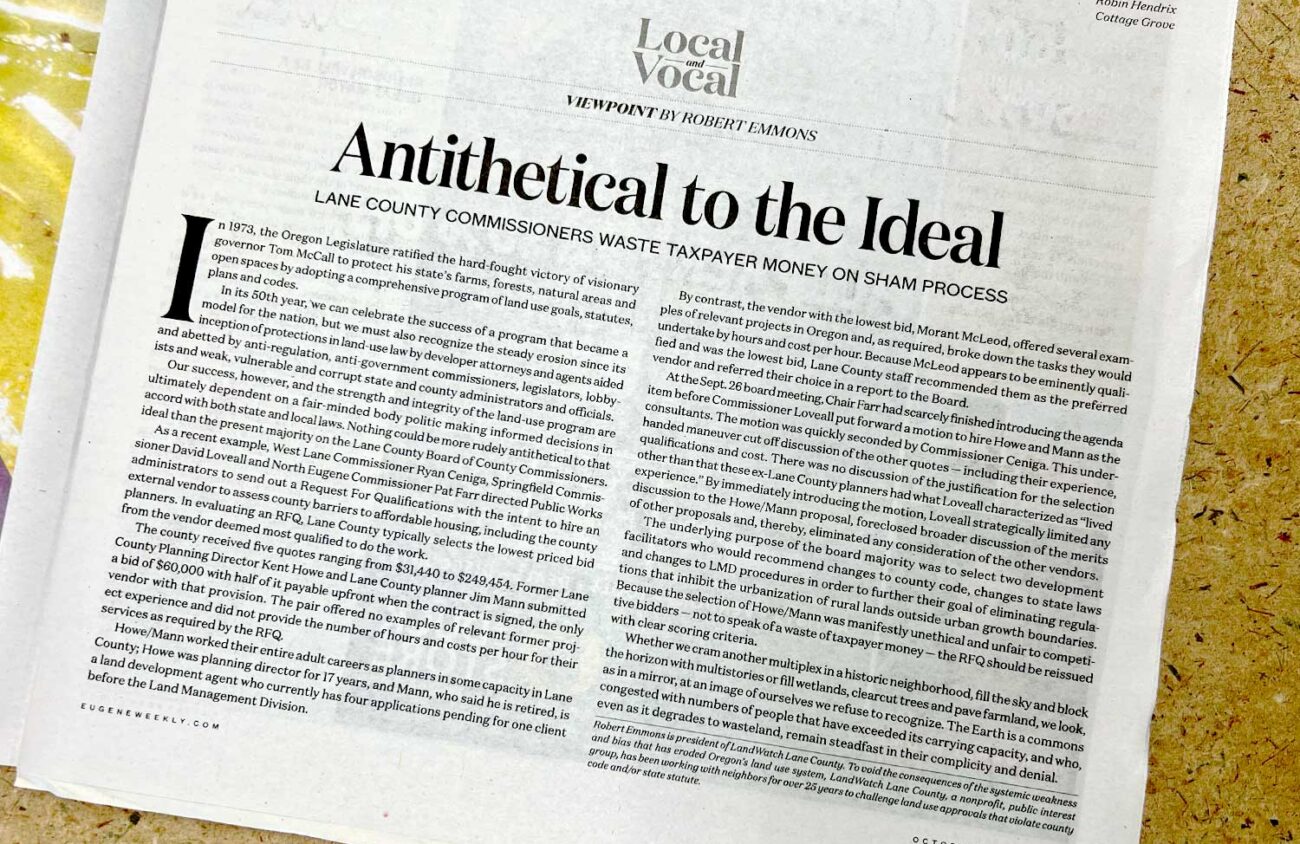In 1973, the Oregon Legislature ratified the hard-fought victory of visionary governor Tom McCall to protect his state’s farms, forests, natural areas and open spaces by adopting a comprehensive program of land use goals, statutes, plans and codes.
In its 50th year, we can celebrate the success of a program that became a model for the nation, but we must also recognize the steady erosion since its inception of protections in land-use law by developer attorneys and agents aided and abetted by anti-regulation, anti-government commissioners, legislators, lobbyists and weak, vulnerable and corrupt state and county administrators and officials.
Our success, however, and the strength and integrity of the land-use program are ultimately dependent on a fair-minded body politic making informed decisions in accord with both state and local laws. Nothing could be more rudely antithetical to that ideal than the present majority on the Lane County Board of County Commissioners.
As a recent example, West Lane Commissioner Ryan Ceniga, Springfield Commissioner David Loveall and North Eugene Commissioner Pat Farr directed Public Works administrators to send out a Request For Qualifications with the intent to hire an external vendor to assess county barriers to affordable housing, including the county planners. In evaluating an RFQ, Lane County typically selects the lowest priced bid from the vendor deemed most qualified to do the work.
The county received five quotes ranging from $31,440 to $249,454. Former Lane County Planning Director Kent Howe and Lane County planner Jim Mann submitted a bid of $60,000 with half of it payable upfront when the contract is signed, the only vendor with that provision. The pair offered no examples of relevant former project experience and did not provide the number of hours and costs per hour for their services as required by the RFQ.
Howe/Mann worked their entire adult careers as planners in some capacity in Lane County; Howe was planning director for 17 years, and Mann, who said he is retired, is a land development agent who currently has four applications pending for one client before the Land Management Division.
By contrast, the vendor with the lowest bid, Morant McLeod, offered several examples of relevant projects in Oregon and, as required, broke down the tasks they would undertake by hours and cost per hour. Because McLeod appears to be eminently qualified and was the lowest bid, Lane County staff recommended them as the preferred vendor and referred their choice in a report to the Board.
At the Sept. 26 board meeting, Chair Farr had scarcely finished introducing the agenda item before Commissioner Loveall put forward a motion to hire Howe and Mann as the consultants. The motion was quickly seconded by Commissioner Ceniga. This underhanded maneuver cut off discussion of the other quotes — including their experience, qualifications and cost. There was no discussion of the justification for the selection other than that these ex-Lane County planners had what Loveall characterized as “lived experience.” By immediately introducing the motion, Loveall strategically limited any discussion to the Howe/Mann proposal, foreclosed broader discussion of the merits of other proposals and, thereby, eliminated any consideration of the other vendors.
The underlying purpose of the board majority was to select two development facilitators who would recommend changes to county code, changes to state laws and changes to LMD procedures in order to further their goal of eliminating regulations that inhibit the urbanization of rural lands outside urban growth boundaries. Because the selection of Howe/Mann was manifestly unethical and unfair to competitive bidders — not to speak of a waste of taxpayer money — the RFQ should be reissued with clear scoring criteria.
Whether we cram another multiplex in a historic neighborhood, fill the sky and block the horizon with multistories or fill wetlands, clearcut trees and pave farmland, we look, as in a mirror, at an image of ourselves we refuse to recognize. The Earth is a commons congested with numbers of people that have exceeded its carrying capacity, and who, even as it degrades to wasteland, remain steadfast in their complicity and denial.
